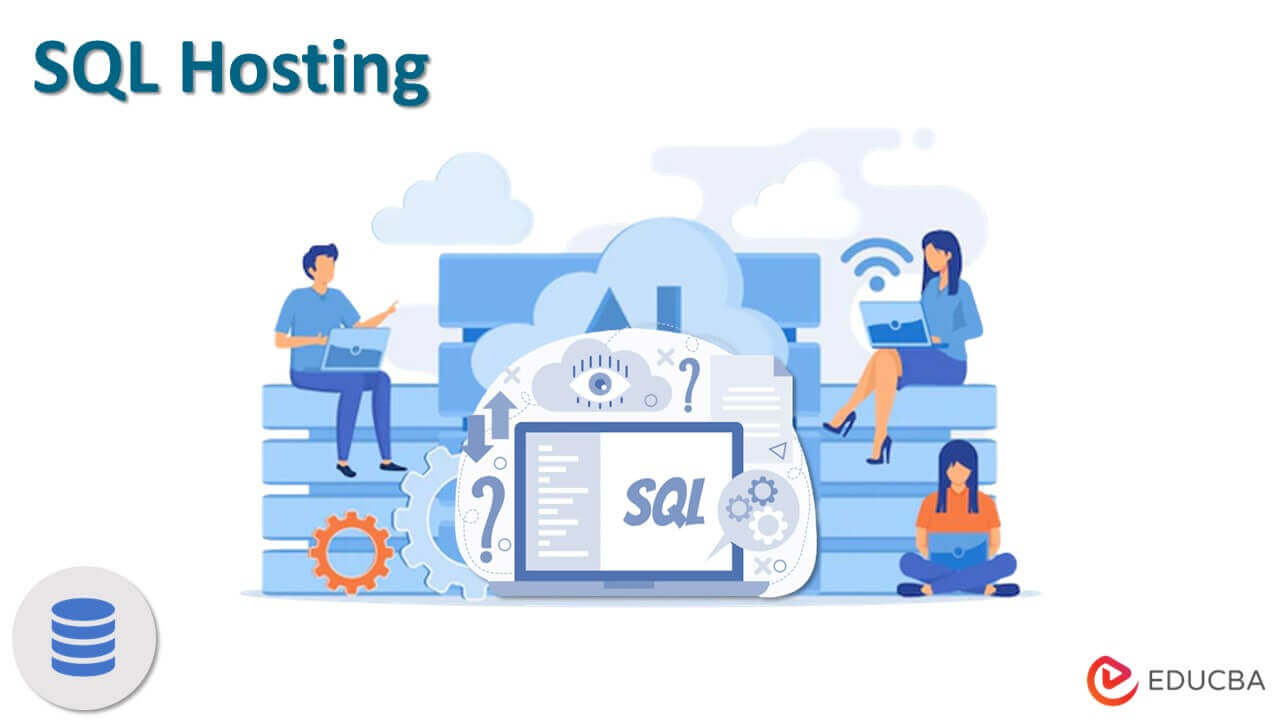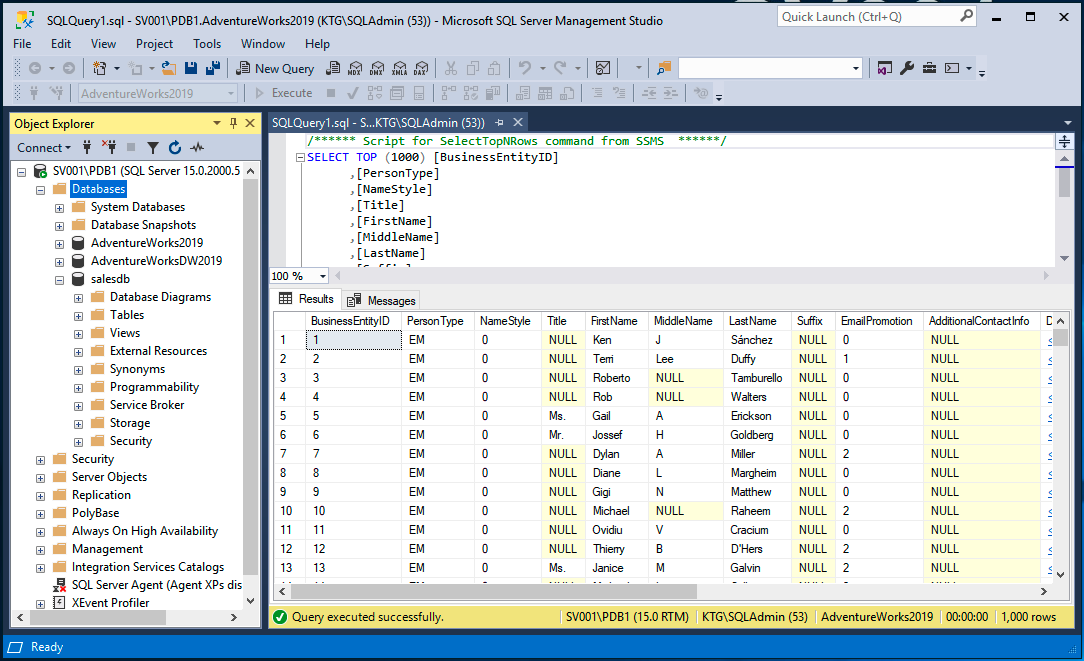SQL hosting, a cornerstone of modern web development, provides a dedicated environment for your relational databases, ensuring efficient storage, retrieval, and management of your critical data. Unlike traditional database hosting, which focuses on general-purpose servers, SQL hosting is specifically tailored to meet the unique demands of SQL databases.
From e-commerce platforms to complex web applications, SQL hosting offers a robust foundation for diverse use cases. By choosing the right SQL hosting service, you gain access to a range of features that streamline database management, enhance performance, and bolster security. Whether you’re a seasoned developer or a budding entrepreneur, understanding the intricacies of SQL hosting empowers you to make informed decisions and optimize your database infrastructure for success.
What is SQL Hosting?
SQL hosting is a service that provides a dedicated environment for storing and managing SQL databases. It’s like renting a secure space specifically designed for your SQL data, allowing you to focus on building and running your applications without worrying about the complexities of managing the underlying infrastructure.
Unlike traditional database hosting, which often focuses on generic databases and might not offer specialized features for SQL, SQL hosting is tailored to the specific needs of SQL databases. This means you get optimized performance, enhanced security, and tools specifically designed for working with SQL.
Common Use Cases for SQL Hosting
SQL hosting is used in a wide range of applications, including:
- Web Applications: Many websites and web applications rely on SQL databases to store user data, product information, and other critical content. SQL hosting provides a robust and scalable platform for managing these databases.
- E-commerce Platforms: Online stores use SQL databases to track inventory, customer orders, and payment information. SQL hosting ensures reliable and secure storage for these sensitive data.
- Enterprise Resource Planning (ERP) Systems: ERP systems, which manage various business processes, often rely on SQL databases to store data related to finances, inventory, and human resources. SQL hosting offers the necessary performance and security for these critical applications.
- Data Warehousing and Analytics: Organizations use SQL databases to store and analyze large datasets. SQL hosting provides the storage capacity and tools needed for data warehousing and business intelligence applications.
Types of SQL Hosting Services

SQL hosting services are essential for businesses and individuals who need to store and manage their data efficiently. These services offer various options, each tailored to different needs and budgets. Understanding the different types of SQL hosting is crucial for choosing the right solution for your specific requirements.
Managed SQL Hosting
Managed SQL hosting provides a comprehensive solution where the hosting provider handles all aspects of server management, including hardware, software, security, and maintenance. This type of hosting is ideal for users who prefer a hands-off approach and want to focus on their applications rather than server administration.
- Features: Managed SQL hosting offers features such as automatic backups, security updates, performance monitoring, and 24/7 support.
- Benefits: The main benefits of managed SQL hosting include ease of use, reduced administrative overhead, and improved security.
- Drawbacks: The primary drawback of managed SQL hosting is the higher cost compared to self-managed options.
Popular providers of managed SQL hosting include:
- Amazon Relational Database Service (RDS)
- Google Cloud SQL
- Microsoft Azure SQL Database
Self-Managed SQL Hosting
Self-managed SQL hosting provides users with complete control over their database server. Users are responsible for all aspects of server management, including installation, configuration, security, and maintenance. This type of hosting is suitable for users with technical expertise who want maximum flexibility and control over their database environment.
- Features: Self-managed SQL hosting offers features such as full customization, advanced configuration options, and granular control over resources.
- Benefits: The main benefits of self-managed SQL hosting include cost-effectiveness, flexibility, and customization.
- Drawbacks: The primary drawbacks of self-managed SQL hosting include the need for technical expertise, increased administrative overhead, and potential security risks.
Examples of self-managed SQL hosting providers include:
- DigitalOcean
- Linode
- Vultr
Cloud-Based SQL Hosting
Cloud-based SQL hosting is a type of managed SQL hosting that leverages the resources of a cloud provider. This approach offers the benefits of managed hosting, such as ease of use and scalability, while also providing the flexibility and cost-effectiveness of cloud computing.
- Features: Cloud-based SQL hosting offers features such as pay-as-you-go pricing, elastic scaling, and high availability.
- Benefits: The main benefits of cloud-based SQL hosting include scalability, cost-effectiveness, and reliability.
- Drawbacks: The primary drawback of cloud-based SQL hosting is the potential for vendor lock-in and dependence on the cloud provider.
Popular providers of cloud-based SQL hosting include:
- Amazon Relational Database Service (RDS)
- Google Cloud SQL
- Microsoft Azure SQL Database
Choosing the Right SQL Hosting Service
Selecting the appropriate SQL hosting service is crucial for ensuring optimal performance, scalability, and security for your database-driven applications. Several factors come into play when making this decision, and understanding these factors is essential for choosing the right hosting solution.
Factors to Consider
Choosing the right SQL hosting service requires considering several factors, including database size, traffic volume, security requirements, and budget.
- Database Size: The size of your database plays a significant role in determining the hosting service you need. A large database requires a hosting service with ample storage space and processing power.
- Traffic Volume: High traffic volume necessitates a hosting service capable of handling a large number of requests simultaneously.
- Security Requirements: Data security is paramount. Choose a hosting service with robust security features like data encryption, firewalls, and regular security updates.
- Budget: Your budget will influence the type of hosting service you can afford. Consider the cost of the service, as well as any additional features or support options.
Decision-Making Process
A structured approach to selecting the best SQL hosting service is essential.
- Define Your Needs: Start by clearly identifying your database requirements. Consider the size of your database, the expected traffic volume, your security needs, and your budget.
- Research Hosting Providers: Explore different hosting providers, examining their features, pricing, and customer reviews.
- Compare Hosting Options: Create a shortlist of potential hosting providers and compare their features, pricing, and performance.
- Consider Scalability: Choose a hosting service that can scale with your growing needs.
- Evaluate Support Options: Ensure the hosting provider offers reliable customer support and documentation.
Tips and Best Practices, Sql hosting
Here are some tips and best practices for evaluating different hosting options:
- Read Customer Reviews: Customer reviews provide valuable insights into the reliability and performance of a hosting service.
- Check for Security Certifications: Look for hosting providers with security certifications like SOC 2 or ISO 27001.
- Request a Free Trial: Take advantage of free trials to test the hosting service and its features before committing.
- Consider Managed Hosting: Managed hosting services handle database administration tasks, freeing you to focus on your applications.
- Compare Performance Metrics: Look at performance metrics like uptime, response times, and database query execution times.
Benefits of SQL Hosting

SQL hosting offers numerous advantages that can significantly enhance your database management and overall application performance. By leveraging the power of specialized SQL hosting services, businesses can streamline operations, improve efficiency, and unlock new levels of scalability and security.
Scalability
Scalability is a crucial aspect of database management, especially for businesses experiencing rapid growth or fluctuating workloads. SQL hosting solutions provide the flexibility to scale your database resources up or down as needed, ensuring optimal performance and cost efficiency. This dynamic scaling capability allows you to adapt to changing demands without compromising on data integrity or accessibility.
Reliability
Reliability is paramount in database management, as downtime can have severe consequences for businesses. SQL hosting services prioritize high availability and redundancy measures to ensure uninterrupted access to your data. With features like automated backups, failover mechanisms, and 24/7 monitoring, SQL hosting minimizes the risk of data loss and downtime, providing peace of mind for businesses of all sizes.
Performance
SQL hosting solutions are designed to deliver exceptional performance, enabling fast and efficient data processing and retrieval. By leveraging optimized hardware, software, and network infrastructure, SQL hosting services provide a robust environment that maximizes database speed and responsiveness. This enhanced performance translates to faster application loading times, improved user experience, and increased productivity.
Security
Data security is a top priority for any business, and SQL hosting services offer robust security measures to protect your sensitive information. These services employ advanced security protocols, firewalls, and intrusion detection systems to prevent unauthorized access and data breaches. Regular security audits and updates ensure that your database remains protected against evolving threats.
Cost Efficiency
SQL hosting can significantly reduce operational costs associated with database management. By outsourcing database infrastructure and management tasks to specialized providers, businesses can eliminate the need for in-house expertise, hardware investments, and ongoing maintenance expenses. This cost-effective approach allows businesses to focus on their core competencies while benefiting from a reliable and scalable database solution.
Streamlined Database Management
SQL hosting simplifies database management by providing a comprehensive suite of tools and features. From automated backups and performance monitoring to user management and access control, SQL hosting services streamline administrative tasks, freeing up IT resources to focus on strategic initiatives. This streamlined approach enhances efficiency and productivity, enabling businesses to optimize their database operations.
Real-World Examples
- E-commerce businesses can leverage SQL hosting to handle massive spikes in traffic during promotional events or holiday seasons, ensuring a seamless shopping experience for customers.
- Financial institutions rely on SQL hosting to securely store and process sensitive financial data, meeting regulatory compliance requirements and protecting customer information.
- Healthcare providers utilize SQL hosting to manage electronic health records (EHRs), ensuring data integrity, security, and compliance with HIPAA regulations.
Features of SQL Hosting Services
SQL hosting services offer a wide range of features designed to enhance database performance, security, and management. These features are essential for businesses of all sizes that rely on databases for their operations.
Database Backups
Regular database backups are crucial for data recovery in case of hardware failure, accidental deletion, or malicious attacks.
- Feature: Automated Backups
- Description: SQL hosting providers often offer automated backups that run at scheduled intervals, ensuring that data is backed up regularly and consistently.
- Benefits: Automated backups minimize the risk of data loss and ensure rapid recovery in case of an emergency. They also free up valuable time and resources for other tasks.
- Feature: Backup Retention Policies
- Description: Backup retention policies determine how long backups are stored and allow users to access previous versions of their data.
- Benefits: Retention policies provide a safety net for accidental data modifications or deletions, enabling rollback to previous states.
- Feature: Offsite Backups
- Description: Offsite backups store data copies in a geographically separate location, providing an extra layer of protection against disasters such as fires or floods.
- Benefits: Offsite backups ensure data availability even in the event of a catastrophic event at the primary data center.
- Feature: Backup Encryption
- Description: Backup encryption protects data from unauthorized access during storage and transmission.
- Benefits: Encryption ensures data confidentiality and compliance with industry regulations, such as GDPR.
Monitoring Tools
Monitoring tools provide real-time insights into database performance and health, enabling proactive issue identification and resolution.
- Feature: Performance Monitoring
- Description: Performance monitoring tools track key metrics such as CPU usage, memory consumption, and query execution time, providing insights into database performance bottlenecks.
- Benefits: Early detection of performance issues allows for timely optimization, preventing service disruptions and ensuring optimal user experience.
- Feature: Resource Utilization Monitoring
- Description: Monitoring tools track resource usage, including storage space, CPU cycles, and network bandwidth, to identify potential resource constraints.
- Benefits: Resource utilization monitoring helps optimize resource allocation, prevent performance degradation, and ensure efficient use of server resources.
- Feature: Error Logging and Alerting
- Description: Error logging and alerting systems capture and report database errors, notifying administrators of potential issues that require immediate attention.
- Benefits: Proactive error detection and notification enable prompt resolution, minimizing downtime and ensuring system stability.
Disaster Recovery Options
Disaster recovery plans ensure business continuity in the event of a catastrophic event, such as a natural disaster or data center outage.
- Feature: Data Replication
- Description: Data replication creates copies of the database on separate servers, ensuring data availability even if the primary server fails.
- Benefits: Data replication provides high availability, minimizing downtime and ensuring seamless service continuity.
- Feature: Failover Mechanisms
- Description: Failover mechanisms automatically switch to a backup server if the primary server becomes unavailable, ensuring uninterrupted service.
- Benefits: Failover mechanisms guarantee business continuity and minimize disruption during outages.
- Feature: Disaster Recovery Testing
- Description: Disaster recovery testing simulates a real-world disaster scenario to validate the effectiveness of the disaster recovery plan.
- Benefits: Testing ensures that the disaster recovery plan is functional and that the organization can recover data and operations quickly and efficiently.
Support Services
Support services provide assistance with database management, troubleshooting, and security.
- Feature: 24/7 Technical Support
- Description: 24/7 technical support ensures that assistance is available at any time, addressing urgent issues and minimizing downtime.
- Benefits: Round-the-clock support provides peace of mind, knowing that expert help is always available.
- Feature: Database Administration Services
- Description: Database administration services provide expert assistance with database management tasks such as performance tuning, security configuration, and backup management.
- Benefits: Database administration services free up internal resources, allowing IT teams to focus on other strategic initiatives.
- Feature: Security Monitoring and Auditing
- Description: Security monitoring and auditing services proactively detect and respond to security threats, ensuring data protection and compliance.
- Benefits: Security monitoring and auditing services protect sensitive data from unauthorized access, ensuring compliance with industry regulations and maintaining data integrity.
Future Trends in SQL Hosting

The landscape of SQL hosting is constantly evolving, driven by advancements in cloud computing, data management, and application development. Emerging trends are shaping the future of SQL hosting, offering new possibilities for performance, scalability, and cost-effectiveness.
Serverless Databases
Serverless databases are a key trend in SQL hosting. This approach eliminates the need for managing infrastructure, allowing developers to focus solely on building applications. Serverless databases are automatically scaled based on demand, ensuring optimal performance and resource utilization.
- Reduced Operational Overhead: Serverless databases eliminate the need for server provisioning, configuration, and maintenance, freeing up development teams to focus on core business logic.
- Automatic Scaling: Serverless databases automatically scale resources up or down based on application demand, ensuring optimal performance and resource utilization without manual intervention.
- Pay-as-you-go Pricing: Serverless databases are billed based on actual usage, providing cost-effectiveness and reducing unnecessary expenditure on idle resources.
Containerization
Containerization is revolutionizing application deployment and management, including SQL databases. Containers provide a lightweight and portable environment for running applications, enabling consistent deployment across different environments.
- Consistent Environments: Containers ensure that applications run consistently across different development, testing, and production environments, minimizing compatibility issues.
- Improved Deployment Speed: Containers enable faster application deployment by packaging all necessary dependencies and configurations, simplifying the deployment process.
- Enhanced Scalability: Containerization allows for easy scaling of SQL databases by deploying multiple containers, providing increased capacity and performance.
Edge Computing
Edge computing brings data processing and storage closer to the users, reducing latency and improving performance. This trend is transforming SQL hosting by enabling real-time data processing and analysis at the edge.
- Reduced Latency: Edge computing minimizes the distance between data sources and processing units, resulting in faster response times and improved user experience.
- Real-Time Data Processing: Edge computing enables real-time data processing and analysis, facilitating faster decision-making and more agile operations.
- Improved Security: Edge computing can enhance data security by keeping sensitive data closer to users and reducing the risk of data breaches.
Last Recap
As the landscape of web development continues to evolve, SQL hosting remains a crucial element in ensuring the smooth operation and scalability of your online ventures. By embracing the benefits of dedicated SQL environments, you empower your applications to thrive, unlocking the full potential of your data and driving innovation. Whether you’re building a simple website or a sophisticated enterprise-level application, SQL hosting provides the foundation for a secure, reliable, and high-performing database infrastructure, paving the way for growth and success.




